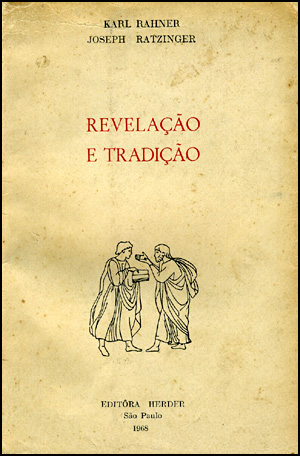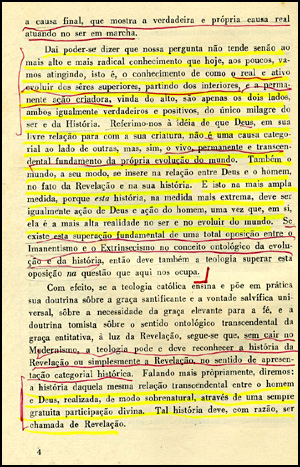Fr. Karl Rahner pretends to find a solution for the conflict between Modernism and the Catholic Faith with regard to Revelation.
Modernism stated that Revelation is within a man's mind and takes place everyday when anyone feels an appeal of grace. The Catholic Faith condemned this assertion. On the contrary, it teaches us that Divine Revelation is comprised only of those objective principles of Faith and Morals that God gave us and are contained in Scriptures and in Tradition.
Rahner labels Modernism as Intrinsicism and the Catholic Faith as Extrinsecism. He imagines that he has found a synthesis that would encompass both the thesis and anti-thesis and supercede them.
For him Divine Revelation would be the action of God in History and in keeping the world in motion. By the way, in this last concept Rahner shows himself to be a partisan of universal evolution, which for him would also constitute a part of Revelation.
At right is the cover of the book Revelation and Tradition by Karl Rahner and Joseph Ratzinger. At right below, a photocopy of the Portuguese text. Below, we present our translation of the lines highlighted in yellow.
Two paragraphs before the highlighted text, he asks: "What is Revelation and why is it, despite its divine origin, what is most intimate in human history?" He answers:
Our question looks for the highest and most radical knowledge that today, little by little, we are attaining. That is to say, the knowledge of how the real and active evolving of superior beings from inferior ones, and the permanent creative action coming from on high, are two sides - both equally true and positive - of the single miracle of being and of History.
I refer to the idea that God, in his free relation with the creature, is not a categorial cause [the Prime Mover of Thomism] along with others, but rather the living, permanent, and transcendental source of the evolution of the world.
Also, the world, in its own way, is inserted in the relation between God and man, in the fact of Revelation and in its history. And this takes place on a grand scale, because this history must be equally the action of God and the action of man, since it is the highest reality in the order of being and in the evolution of the world. ...
The history of that transcendental relation between man and God that takes place in a supernatural way through a gratuitous divine participation must be called Revelation.
(Karl Rahner, "Observações sobre o conceito de Revelação," in Karl Rahner and Joseph Ratzinger, Revelação e Tradição, São Paulo: Herder, 1968, p. 4.)
|

 |
